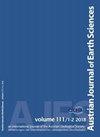Facies, palaeogeography and stratigraphy of the lower Miocene Traisen Formation and Wildendürnbach Formation (former “Oncophora Beds”) in the Molasse Zone of Lower Austria
IF 1.1
4区 地球科学
Q2 Earth and Planetary Sciences
引用次数: 5
Abstract
Abstract A detailed study of OMV wells throughout the Lower Austrian Molasse Basin demonstrates the existence of a distinct and synchronous upper Ottnangian (lower Miocene) stratigraphic signal, the Calcite Minimum Interval (CMI). It corresponds to the depositional phase of the Rzehakia Lake System. This signal is interpreted to be of chronostratigraphic importance as an expression of palaeoclimate and related sea-level change. It is represented by the brackish Traisen Formation, which crops out south of the Danube. The Traisen Formation correlates with sands and shales in OMV wells to the north, termed Wildendürnbach Formation. However, the CMI underlies a marine unit, the so-called “Oncophora Beds” (also known as Rzehakia Beds) as reported from OMV wells in the north at the border to the Czech Republic. We demonstrate that these former “Oncophora Beds” are younger, i.e. of Karpatian age, than originally assumed. Therefore, these deposits cannot be correlated to the late Ottnangian Traisen Formation. This may solve the problem of contradicting interpretations concerning the depositional environment of both units, which were correlated to each other in the past. As no Rzehakia bivalves (formerly Oncophora) are described from these former “Oncophora Beds”, we recommend to avoid using the term for these turbiditic sands. Instead, we attribute these deposits to the fully marine Karpatian Laa Formation. These new findings, which are in accordance with published data from the Czech Republic, indicate two (in time and space) independent sedimentary systems and sand deposition centres for the Traisen Formation and the massive sands attributed as “Oncophora Beds” around Wildendürnbach. A late Ottnangian system in the south delivered the material of the Traisen Formation from the Alps and a Karpatian system delivered the clastic material of the massive sands of the Laa Formation from the east.下奥地利Molasse带下中新世Traisen组和Wildendürnbach组(前“Oncophora床”)的相、古地理和地层学
摘要对整个下奥克拉塞盆地OMV井的详细研究表明,存在一个独特且同步的上奥(下中新世)地层信号,即方解石最小间隔(CMI)。它对应于Rzehakia湖系的沉积阶段。该信号被解释为具有年代地层重要性,是古气候和相关海平面变化的一种表现。它以多瑙河以南的淡咸水三里森组为代表。Traisen组与北部OMV井中的沙子和页岩相关,称为Wildendürnbach组。然而,CMI是一个海洋单元的基础,即所谓的“Oncophora Beds”(也称为Rzehakia Beds),据报道,该单元来自捷克共和国边境北部的OMV井。我们证明,这些以前的“Oncophora床”比最初假设的更年轻,即Karpatian年龄。因此,这些矿床不能与奥特南纪晚期的三里生组相关联。这可以解决关于两个单元的沉积环境的相互矛盾的解释问题,这两个单元在过去是相互关联的。由于这些以前的“Oncophora海床”中没有Rzehakia双壳类(以前的Oncophola)的描述,我们建议避免使用该术语来形容这些浊积沙。相反,我们将这些矿床归因于完全海相的Karpatian Laa组。这些新发现与捷克共和国公布的数据一致,表明特赖森组和维尔登杜恩巴赫周围被称为“Oncophora床”的块状砂有两个(在时间和空间上)独立的沉积系统和砂沉积中心。南部的晚奥特南纪系统从阿尔卑斯山输送了特赖森组的物质,而卡拉帕阶系统从东部输送了拉组块状砂的碎屑物质。
本文章由计算机程序翻译,如有差异,请以英文原文为准。
求助全文
约1分钟内获得全文
求助全文
来源期刊

Austrian Journal of Earth Sciences
Earth and Planetary Sciences-Paleontology
CiteScore
3.10
自引率
0.00%
发文量
0
审稿时长
>12 weeks
期刊介绍:
AUSTRIAN JOURNAL OF EARTH SCIENCES is the official journal of the Austrian Geological, Mineralogical and Palaeontological Societies, hosted by a country that is famous for its spectacular mountains that are the birthplace for many geological and mineralogical concepts in modern Earth science.
AUSTRIAN JOURNAL OF EARTH SCIENCE focuses on all aspects relevant to the geosciences of the Alps, Bohemian Massif and surrounding areas. Contributions on other regions are welcome if they embed their findings into a conceptual framework that relates the contribution to Alpine-type orogens and Alpine regions in general, and are thus relevant to an international audience. Contributions are subject to peer review and editorial control according to SCI guidelines to ensure that the required standard of scientific excellence is maintained.
 求助内容:
求助内容: 应助结果提醒方式:
应助结果提醒方式:


